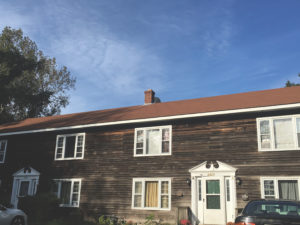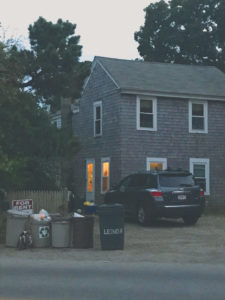
TRURO — Last week the Truro Board of Health gave a landlord up to 15 days to begin repairs to his motel where about 50 tenants live year-round. If Daniel Delgizzi, of Braintree, and his son David fail to meet the town’s deadlines for the Truro Motor Inn repairs, the town will petition the housing court to place the properties in receivership.
This will put the monthly rent from 36 units, estimated at $400,000 a year, into a special account to be used only to repair the property to so it meets health codes. Using a receiver in this way has proved to be an effective tool to protect tenants from uncooperative landlords, said Raymond Yox, managing attorney of the Hyannis office of South Coastal Counties Legal Services, an agency that provides legal aid to the poor in civil cases.
On Cape Cod, the Pocasset Mobile Home Park was rehabilitated through a receiver, its failed septic system fixed, and returned to the original owners with conditions in 2018, he said.
A similar solution is sought in Truro, where last Thursday night emotions ran high as tenants, many from Jamaica, crowded into town hall to talk about what would happen if the health board shut down the motor inn for serious code violations including overcrowding, overloaded electrical outlets, and a failed septic system.
“Before I moved there, I moved seven times,” said one man from Jamaica. “We plow streets … we take care of the old people and if it weren’t for David [Delgizzi], we wouldn’t be here today.”
Amy Paine said she had lived there since 2015. She waited 27 years before getting a state housing voucher but still couldn’t find a place to rent until she came upon the Truro Motor Inn.
“If you people pull this license there are going to be a lot of homeless people,” Paine said. “It would be a shame. There is no place for us to go.”
Many properties, lots of unpaid taxes
The Truro Motor Inn was the first property that Daniel Delgizzi purchased on Cape Cod in the 1960s, said Carolyn Delgizzi, who lives with her husband, David, in Weston and was the only family member to attend the Truro meeting. She said her father-in-law bought other properties over the years, including two restaurants, the Lobster Pound in Orleans and the Lobster Shanty in Eastham. Several of these properties are now rundown and occupied by tenants with no other choices in an extremely tight rental market.

The Delgizzis are years behind in property tax payments. Provincetown is in the process of taking tax title on a Delgizzi-owned property at 341 Bradford St., said Alexander Williams, the town treasurer.
In Eastham, where the Delgizzis own 10 properties, taxes have also not been paid on some of them since as far back as 2014. The town of Eastham is also pursuing takings of those homes, said Town Administrator Jacqueline Beebe.
Beebe said dealing with the Delgizzis has been a constant battle. Besides the delinquent taxes, none of the properties has a rental certificate, so they do not get inspected, even though they all have tenants, including several children, Beebe said.
One tenant, who spoke on condition of anonymity, said the Delgizzis refuse to tie into the Eastham town water system despite the fact that the well water at their Route 6 property comes out of the faucets brown.
Another tenant living at a complex of duplexes owned by the Delgizzis in Eastham said she pays $1,850 a month in cash to house herself and her children. She says David is a “good landlord” but she doesn’t understand why he has not paid taxes.
“The town staff and I are all public servants, and we’re trying to support our residents and protect public safety,” the Eastham town administrator said. “How do we take a property owner and landlord like the Delgizzi family and get them to comply and pay taxes without harming the very people we’re trying help? We’re strategically trying to get the results we need without hurting these people.”
Towns take different tacks
Carolyn Delgizzi said there are no problems with the family except that her father-in-law is elderly. She said they plan to pay back all the taxes very soon and comply with the Truro Board of Health’s timelines.
Truro town officials, however, said that’s highly unlikely.
They described years of struggle with the Delgizzis, their constant postponement of inspections, and repeated no-shows at board meetings. The family has been on the town’s regulatory radar for years for problems at their Truro properties, which include about 73 housing units comprising former motel rooms, cottages, houses, and apartments. Peter Van Stratum, of the board of health, said the chance of the Delgizzi family cooperating is “less than zero.”
Another board of health member, Mark Peters, said once a group of tenants from a Delgizzi property on Moses Way with 21 units came “en masse” to a board of health meeting “in their pajamas and bathrobes” to protest rumors of eviction due to the town’s repeated attempts to get trash and unlicensed vehicles removed from the property.
One unit at the motor inn had an extension cord that looked like it came from the Christmas Tree Shop on one electrical socket. It was connected to a refrigerator, microwave, and TV, Stratum said. “These are things I find unacceptable,” he said. “All these things have been recognized and we say ‘Everyone go ahead and live there.’ If something happens, then the town of Truro is liable.”
The Delgizzis’ behavior is “insulting,” Stratum added.
But since the receivership plan would allow the tenants to stay for the time being anyway, the board voted 4-1 in favor of that, rather shuttering the inn. Stratum cast the sole negative vote.

Eastham is pursuing a property taking for nonpayment of taxes, which is a slower process. Beebe is also trying to keep the Eastham tenants from becoming homeless, she said.
Beebe said it’s taken two years of court action to get two of the Delgizzi properties at 2835 and 2815 Route 6 into town ownership. The Delgizzis owe around $33,000 in taxes on them. But if they pay that off within a year, ownership reverts back to them, she said.
Beebe said she’s trying to be fair and also get results. The Delgizzi situation exposes the desperation of trying to find decent housing on the Outer Cape. Many of the tenants earn too much to quality for affordable housing, Beebe added.
“One positive is it has brought all the community of housing advocates and the government together,” she said.
